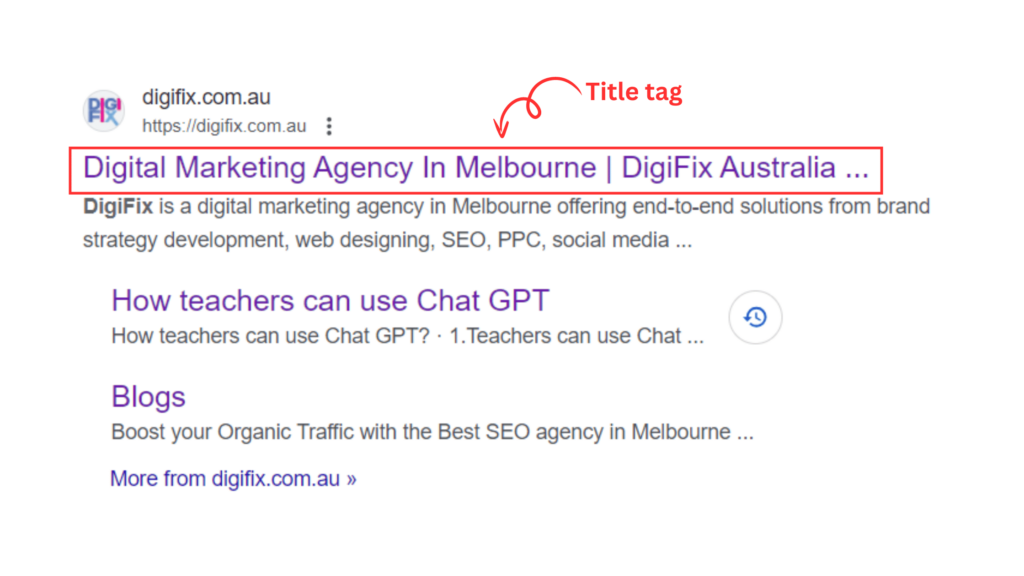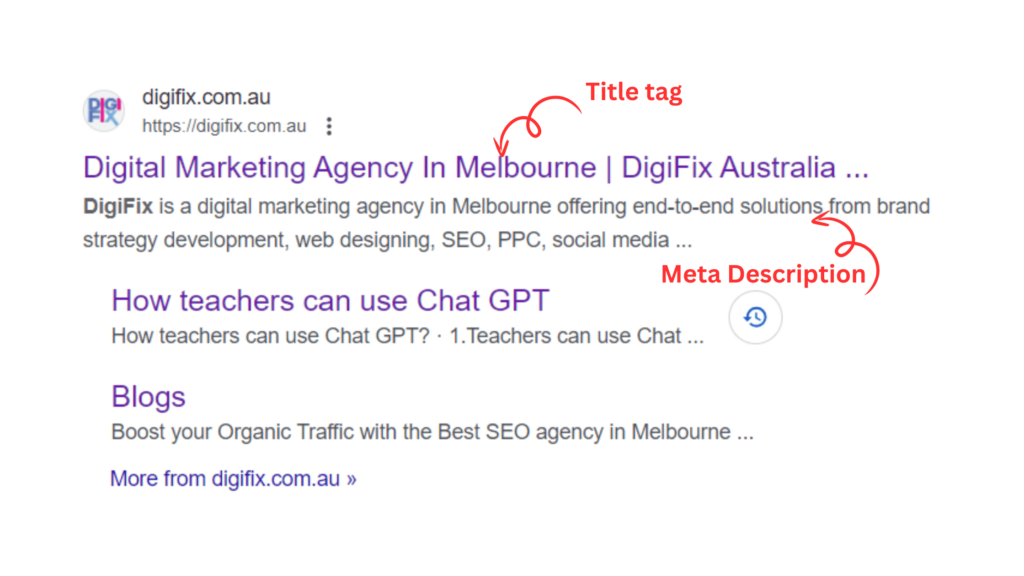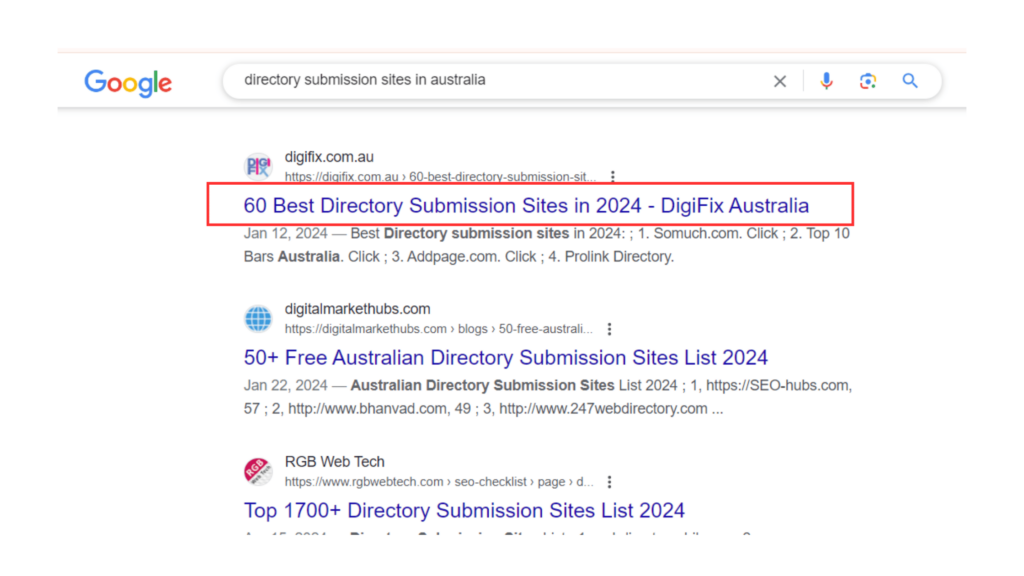In this blog, let’s learn what is a title tag in SEO & how to write the perfect SEO-friendly title tag with tips.
Just as the title of a book grabs your attention, a web page’s meta title tag serves as the initial invitation for users to click on your page in search engine results pages (SERPs).
When users conduct a Google search, they’re presented with multiple links, all competing for their attention. That’s where your title tag comes in. It’s like a short description that tells people what your page is about, helping them decide whether to click on it.
So, by making your title tag appealing, you can increase the chances of getting clicks and visitors to your site.
What is a Title Tag?
A title tag is an HTML element that indicates the title of a web page and informs both search engines and users about what to expect on the page. You can notice a Title tag in search engine results pages (SERPs) as a clickable headline.

That makes it the first thing your audience sees when they discover your brand on search engines like Google or Bing.
The title tag also appears on browser tabs and in link previews, so it should show the essence of the web page’s content.
Title Tag vs. Page Title: The terms “title tag” and “page title” are alike. Some content management systems (CMS) might refer to the title you want in SERPs as the “page title.”
Title Tag vs. Meta Title: “Title tag” and “meta title” are also synonyms and can be referred to as an SEO title or SEO page title.
Title Tag vs. H1: A title tag appears as a SERP headline, whereas an H1 tag shows up on the actual page as its main heading. They can be identical or similar, but should not be too different.
Title Tag vs. Meta Description: Meta descriptions appear under title tags in SERPs and provide a summary of the page. It’s important to align the meta description with the title tag to ensure relevance.

Rule of Thumb for Title Tag Length
With Google’s recent title update, shorter titles are better. If the title is too long, search engines are more likely to rewrite the title tags.
Guidelines for Title Tag Length:
- Maximum Length: 60 characters or 575 pixels
- Minimum Length: 30 characters or 285 pixels
These lengths generally work well for most devices and search engines like Google, Yahoo, and Bing. However, there’s no assurance that your title will be displayed exactly as written, as search engines ultimately decide how to present it.
Why Are Title Tags Important?
Title tags are one of the primary indicators to search engines of what your page is about. Search engines use these tags to help determine the relevancy of a webpage, making them one of the most significant on-page ranking factors you can easily control.
Here are two main reasons why title tags matter to SEO:
1.Title Tags impact your rank in Search Results.
Google has directly stated that its algorithms consider title tags when ranking pages in search results. Specifically, Google uses the title tag as one of several factors to determine the content and purpose of a page.
Therefore, it’s crucial for your title tags to accurately represent the purpose of the pages they’re associated with. That helps search engines understand and index your page better and ensures that your page ranks in relevant search results.
Essentially, a well-crafted title tag tells search engines what your page is about, which helps in ranking it appropriately.
2.Title Tags Impact Clicks to Your Website
Google aims to deliver the most relevant search results to users. If people aren’t clicking pages on your site, Google will presume that it isn’t relevant and may rank your website lower.
Your title tag plays a key role in determining whether someone clicks on your listing. A relevant and optimized title tag informs users exactly what to expect from your page, increasing the probability that they will click on it.
Conversely, an irrelevant or misleading title tag can lead to users bouncing back to the search result page, which negatively impacts your ranking.
How to write an SEO Friendly Title Tag?
Here are some tips for writing perfect title tags that search engines love.
1.Add your Target Keywords within the title tag.
Google uses the title tag to determine the content of a web page and check if it matches a user’s search query. Include your primary keyword or a long-tail keyword variation as early as possible in the title. If your business relies on local customers, add your city or state in the title.
However, avoid keyword stuffing in your page title just for the sake of SEO. It sounds unnatural to both Google and humans and can lead to negative reactions from both. For example, avoid writing a title like: “Best cheap affordable iPhone cell phone covers.”
2.Add a Hook to attract people.
To create a title tag that draws people in, add a captivating message or eye-catching words. The title tag should address customer pain points and can include a hook in various ways.
Emotion is a powerful hook to target people, achieved through the right descriptive words. Instead of adding a title like “Healthy Eating Tips,” fine-tune it with terms like “Essential Healthy Eating Tips for a Quality Life.”
While keeping your core keywords, ensure your title resonates with people.
3.Add Unique titles for each page on your site.
Ensuring each page on your website has a unique title is essential for SEO. Search engines prioritize unique title tags because they provide clear information about the content of each page. When multiple pages have the same or very similar titles, it can confuse search engines and lead to lower rankings.
For example, imagine a website selling various types of shoes. If every product page has the title “Men’s Running Shoes,” search engines won’t know which specific product each page is about. This lack of differentiation can result in lower visibility for individual products in search results.
Each page should have a unique title that accurately reflects its content. For example, instead of using “Men’s Running Shoes” as the title for every product page, the website could create unique titles like “Nike Air Zoom Pegasus – Men’s Running Shoes” or “Adidas Ultra Boost – Men’s Running Shoes.”
These unique titles provide specific information about each product, making it easier for search engines to understand and rank them properly.
4.Understand user intent and write relevant titles
When creating page titles for SEO, it’s essential to focus on meeting the needs of your audience. Your title should directly address what users are searching for. It could be information, a product, or a service.
For example, if your website offers cooking tutorials and a user searches for “easy chicken recipes,” your title could be “Easy Chicken Recipes: Simple Cooking Tutorials.” This title displays that your page provides easy-to-follow recipes that align with the user’s intent.
Similarly, if someone is searching for “Nike Air Max sneakers,” your title could be “Nike Air Max Sneakers: Styles and Deals.” This title shows that your page offers information about Nike Air Max sneakers and any available deals, meeting the user’s needs effectively.
In summary, writing SEO-friendly page titles involves understanding what users are looking for and addressing their needs directly in the title. This approach helps attract relevant traffic to your website and improves your overall SEO performance.
5.Add action words in your title tags.
To make your page titles more effective, use action words that create excitement and engagement. Active verbs and action-oriented language not only make your titles more optimistic but also motivate users to click on them.
For example, instead of a plain title like “Benefits of Yoga,” you could use an action-packed title such as “Transform Your Life with Yoga: Explore the Benefits Now.” Here, the action words “transform” and “explore” make the title more enticing, motivating users to click and discover more about the benefits of yoga.
Similarly, for a fitness program, a title like “Join Our 30-Day Fitness Challenge: Get Fit Today” uses action words like “join” and “get fit” to inspire users to take action and participate in the challenge.
Incorporating action words into your page titles adds excitement and encourages users to click through to your page, ultimately driving more traffic and engagement.
6.Add numbers to your titles.
Including numbers or dates in your page titles can boost click-through rates by providing clear expectations about the content and its relevance. Titles with numbers, such as lists or countdowns, tend to attract attention and imply structured, actionable content.
Additionally, including current dates signals that the content is up-to-date and timely, which can make it more appealing to users seeking the latest information.
For example, a title like “10 Essential Tips for Weight Loss Success” uses a number to indicate that the content has a list of actionable tips, making it more relevant for people looking for practical advice on weight loss.
Check out how we incorporated both current dates and numbers in title tags of our blog.

Similarly, a title like “Top 5 Tech Gadgets of 2024” includes both a number and a date, signaling to people that the content highlights the latest and most relevant tech gadgets available in the current year.
7.Optimize your title tags for local searches.
When optimizing your content for local searches, it’s essential to include relevant local terms or geographic keywords that align with your business or content.
This practice helps attract local search traffic by making your content more visible to users searching for services, products, or information in specific geographic areas.
For instance, if you own a bakery in New York City, including local terms like “NYC bakery,” “Manhattan pastry shop,” or even specific neighborhood names like “Upper East Side bakery” can help ensure that your content appears in relevant local search results.
In summary, optimizing for local searches involves strategically incorporating local terms or geographic keywords into your content to enhance its visibility and relevance to users searching for location-specific information or businesses.
8.Use the optimal length for your title tag.
It’s crucial to use the optimal length for your title tags, typically falling between 50 and 60 characters.
If your title tag is too short, you may not effectively communicate to search engines and potential customers what your page is about. Conversely, if it’s too long, search engines will truncate your title tag with an ellipsis (…) in search results.
By keeping your title tags within the recommended character limit, you ensure that your titles are concise yet descriptive, maximizing their effectiveness in conveying the purpose of your page to both search engines and users.
Avoid These Common Title Tag Mistakes for Better SEO
When you learn how to write a good title tag, it is essential to have a clear understanding of what to do and what not to do. So, here are some common title tag mistakes you should avoid.
1.Making your title tag too long or too short
It’s essential to get the length of your title tag just right. If it’s too short, it lacks description, but if it’s too long, it exceeds Google’s character limit and gets truncated in search results.
Aim for a title tag of less than 60 characters to provide optimal visibility.
For example, if you’re creating a title tag for a blog post about “Healthy Breakfast Recipes,” a title like “Best Healthy Breakfast Recipes for Busy Mornings” effectively represents the content.
However, a title such as “Healthy Breakfast” is too short and lacks detail, while a title like “Delicious and Nutritious Breakfast Ideas for Starting Your Day Right, Including Smoothie Bowls, Avocado Toast, and Oatmeal” is too long and risks being truncated in search results.
2.Overstuffing Keywords
While it’s essential to include your target keyword in the title tag, avoid stuffing it excessively. Keyword stuffing can appear spammy, driving away users and negatively impacting your Google rankings. Ensure a natural and balanced use of keywords in your title tags.
Consider a title tag for a website offering “Online Marketing Services.” A title like “Top Digital Marketing Solutions for Small Businesses” contains the keyword “digital marketing” naturally. However, a title such as “Digital Marketing | SEO | Social Media Marketing | PPC” appears spammy due to excessive keyword stuffing.
3.Failing to Use Proper Title or Sentence Case
Ensure correct capitalization in your title tags to maintain professionalism and readability. Avoid using all caps or all lowercase. Instead, opt for title case (capitalizing the first letter of most words) or sentence case (capitalizing only the first letter of the first word). This enhances the aesthetic appeal and clarity of your title tags.
We hope you got a clear understanding of What is a Title Tag & how to write title tags for SEO. If you like to learn more about SEO, We have published many informative blogs about SEO concepts. Click here to read those.
Introducing DigiFix’s Expert SEO Content Writing Services
At DigiFix, we specialize in providing high-quality SEO-friendly content writing services to elevate your online presence. With us, you can bid farewell to the worries of crafting perfect content, optimizing title tags and meta descriptions, or conducting exhaustive keyword research. We’ve got your back every step of the way.
Our team of seasoned content writers delivers top-notch content that resonates with your target audience and boosts your search engine rankings.
With DigiFix by your side, you can upgrade your digital presence with compelling, SEO-friendly content that drives results. Get in touch with us today to schedule your free consultation.
Do you want more traffic?
—————
Hi, we are an Australian digital agency doing groundbreaking work to help a business like yours reach its full potential. My only question is will you qualify for our services?
Do you want more traffic?
—————
Hi, we are an Australian digital agency doing groundbreaking work to help a business like yours reach its full potential. My only question is will you qualify for our services?





0 Comments